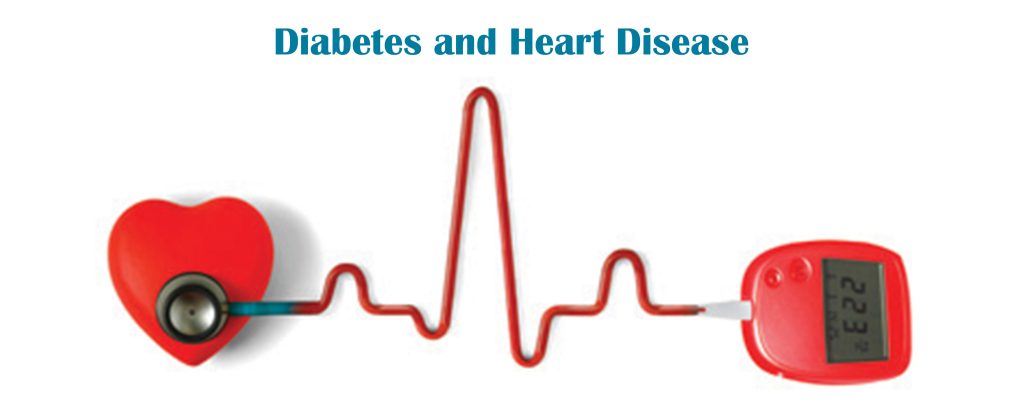Managing diabetes is crucial not only for maintaining blood sugar levels but also for safeguarding your heart health. Studies show that individuals with diabetes are twice as likely to experience heart attacks or strokes compared to those without diabetes. However, by taking proactive steps, you can significantly reduce this risk and improve your overall well-being.

Why Diabetes Increases Heart Disease Risk
Diabetes can impact the cardiovascular system in several ways:
- High Blood Sugar Levels: Elevated glucose can damage blood vessels and weaken the cardiovascular system.
- Increased Blood Pressure: People with diabetes often develop hypertension, further straining the heart.
- Cholesterol Imbalance: Diabetes frequently leads to unhealthy cholesterol levels, increasing the risk of artery blockages.
Fortunately, you can manage these risks effectively by focusing on the ABCs of Diabetes Care: A1C, Blood Pressure, and Cholesterol.
The ABCs of Diabetes Care
A1C: Tracking Blood Sugar Control
The A1C test measures your average blood sugar levels over the past three months. Regular monitoring is essential for tracking your progress and maintaining healthy glucose levels.
- Recommended Levels: The American Diabetes Association (ADA) advises most diabetics to maintain an A1C level below 7%. For some individuals with additional health concerns, doctors may recommend keeping it below 8%.
- Testing Frequency: The A1C test should be conducted two to four times per year depending on your condition.
Daily Blood Sugar Monitoring
In addition to A1C testing, routine blood sugar checks are vital. The frequency of these tests depends on several factors, including your type of diabetes, medication regimen, and doctor’s advice.
- Recommended Levels:
- Fasting Blood Sugar: 80-130 mg/dL
- Post-Meal Blood Sugar (2 hours after eating): Below 180 mg/dL
Keeping a detailed record of your blood sugar readings can help you and your healthcare provider adjust your treatment plan effectively.
Blood Pressure Management
People with diabetes are more prone to developing hypertension, making blood pressure control critical for heart health.
- Target Range: The ADA recommends a blood pressure reading below 130/80 mm Hg for most individuals. However, your doctor may suggest a different target based on your health profile.
- Tips for Managing Blood Pressure:
- Reduce sodium intake.
- Increase your consumption of fruits, vegetables, and whole grains.
- Engage in regular physical activity like walking, swimming, or cycling.
- Manage stress through meditation, yoga, or deep-breathing exercises.
Cholesterol Control
Cholesterol imbalance is a common concern for people with diabetes. There are two key types of cholesterol:
- LDL (Low-Density Lipoprotein): Known as “bad cholesterol,” LDL can lead to artery blockages.
- HDL (High-Density Lipoprotein): Referred to as “good cholesterol,” HDL helps remove LDL from your bloodstream.
- Recommended Levels:
- LDL Cholesterol: Below 100 mg/dL (or under 70 mg/dL for individuals at high risk).
- HDL Cholesterol: Over 40 mg/dL for men and over 50 mg/dL for women.
Triglycerides and Heart Health
Triglycerides are a type of fat in the blood that can rise with elevated blood sugar levels.
- Recommended Level: Below 150 mg/dL
Improving Cholesterol and Triglycerides
To keep cholesterol and triglycerides in check:
- Eat a heart-healthy diet rich in fruits, vegetables, whole grains, and lean proteins.
- Reduce saturated fats, trans fats, and added sugars.
- Exercise regularly to boost HDL cholesterol and lower LDL cholesterol.
Lifestyle Changes to Support Heart Health
Taking care of your overall health plays a significant role in reducing heart disease risks for diabetics.
Healthy Eating Habits
- Prioritize high-fiber foods like oats, beans, and leafy greens.
- Choose lean protein sources such as fish, poultry, and tofu.
- Opt for healthy fats like avocado, nuts, and olive oil.
Physical Activity
- Engage in at least 150 minutes of moderate-intensity exercise per week.
- Include both cardio activities like jogging or swimming and strength training exercises.
Weight Management
- Maintain a healthy weight to reduce strain on your heart and improve blood sugar control.
- Achieve this through balanced nutrition and regular exercise.
Medication and Supplements
- Follow your doctor’s guidance on medications that control blood sugar, blood pressure, and cholesterol.
- Omega-3 fatty acids and fiber supplements may also benefit heart health.
Diabetes Support: Working with Healthcare Professionals
Managing diabetes effectively often requires a team approach. Along with your primary doctor, consulting a Diabetes Care and Education Specialist (DCES) can improve your outcomes. These professionals specialize in providing guidance on medication, nutrition, and lifestyle adjustments.
FAQs:
1. Why are people with diabetes more prone to heart disease?
People with diabetes often experience higher blood sugar levels, which can damage blood vessels, increase blood pressure, and imbalance cholesterol levels. These factors significantly raise the risk of heart disease.
2. What is a healthy A1C level for people with diabetes?
The American Diabetes Association (ADA) recommends maintaining an A1C level below 7% for most individuals with diabetes. However, some may be advised to aim for levels below 8% based on other health conditions.
3. How often should someone with diabetes check their blood sugar?
The frequency depends on the type of diabetes and prescribed treatment. Most individuals check their blood sugar two to four times per day.
4. Can lifestyle changes alone help manage heart health for diabetics?
In many cases, adopting a healthy diet, increasing physical activity, and managing stress can significantly improve heart health. However, some individuals may also require medications for optimal results.
5. What foods should diabetics avoid to reduce heart disease risk?
Diabetics should limit foods high in saturated fats, trans fats, processed sugars, and excessive sodium. Opting for whole, nutrient-dense foods is ideal.




